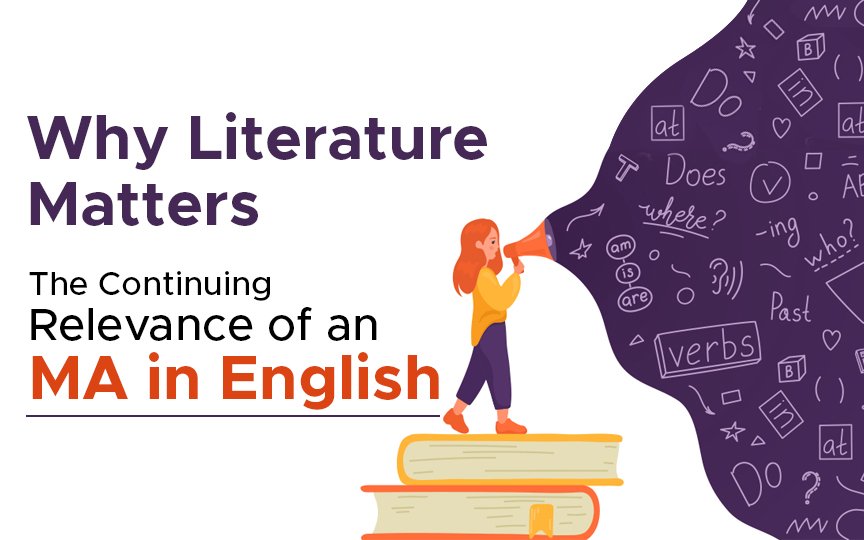In today’s society, where much of our communication is judged through screens and limited to brief, attention-grabbing soundbites, the importance of immersing oneself in the written word may appear outdated. However, the exploration of literature continues to hold immense significance.
Pursuing an Online MA [Master of Arts] in English extends far beyond a mere interest in poetry and prose; rather, it serves as a gateway to developing advanced critical thinking skills, nurturing empathy, and gaining profound insights into the complexities of the human experience.
Literature as a Window to the World
Literature serves as a powerful time machine, offering us the opportunity to journey through distant lands, past eras, and detailed mindscapes. Within the pages of a well-crafted novel, we can immerse ourselves in the joys and sorrows of characters from diverse cultures and backgrounds. Through their experiences, we gain insight into the human condition, promoting empathy and understanding for lives different from our own. Additionally, literature allows us to bear witness to historical events as seen through the eyes of those who lived through them, providing us with a unique perspective on the past.
Furthermore, literature acts as a reflective mirror of society, shedding light on the complexities of human nature and challenging established societal norms. It ignites conversations on pressing issues and encourages critical examination of the world in which we live. By delving into literary works, we are allowed to gain deeper insights into the complexities of our environment, empowering us to engage thoughtfully with the contemporary challenges we face.
The Art of Critical Thinking
The study of literature goes beyond simple reading; it involves the interpretation, analysis, and questioning of texts. Pursuing a Master’s in English Online helps to sharpen critical thinking abilities, which are crucial for navigating the complexities of the contemporary world. Through this program, students develop the skills to uncover hidden meanings, recognize underlying themes, and assess the reliability of information. These competencies are indispensable in various fields, from journalism and law to business.
Moreover, literature inspires us to think imaginatively and challenge established beliefs. It nurtures a sense of intellectual curiosity and the capacity to consider multiple viewpoints. These attributes are essential for fostering innovation and tackling complex problems.
Building a Strong Foundation for Knowledge
The study of literature serves as a cornerstone for various other academic disciplines. It intertwines with history, philosophy, psychology, and sociology, offering a rich understanding of interconnected fields. Pursuing a Master of Arts in English equips individuals with a profound comprehension of these disciplines, empowering them to engage in interdisciplinary exploration and pursue diverse career paths.
Moreover, an in-depth study of the literature fosters robust communication and writing abilities among students. The ability to convey intricate concepts clearly and persuasively is increasingly valuable in today’s competitive job market.
What to Expect in an MA in English
An MA in English offers a rich and diverse curriculum. While specific courses may vary between institutions, some common areas of study include:
- Literary Theory: Exploring different approaches to interpreting literary texts, such as feminism, postcolonialism, and structuralism.
- British Literature: Delving into the rich literary history of England, from Chaucer to contemporary writers.
- American Literature: Studying the development of American literature from its colonial beginnings to the present day.
- World Literature: Exploring the literary traditions of different cultures and their global impact.
- Creative Writing: Developing writing skills through workshops and practice.
- Language Studies: Analyzing the structure and use of the English language.
- Research Methods: Learning how to conduct independent research and write academic papers.
Beyond core courses, many MA programs offer specialized tracks, such as English education, digital humanities, or literary studies.
An online master’s degree in English offers a unique advantage in today’s digital age. The ability to engage directly with the ever-evolving literary landscape. With unparalleled access to digital archives, online journals, and global literary communities, students can immerse themselves in a dynamic, interconnected world of texts and ideas. This digital immersion promotes an understanding of how literature interacts with technology, culture, and society, preparing graduates to be at the forefront of critical lessons and innovation in the humanities.
In conclusion, Obtaining a Master of Arts in English is anything but obscure; in fact, it is an enriching journey that provides individuals with a broad range of knowledge, refined skills, and enhanced critical thinking capabilities, all of which are essential for success in the modern era. By immersing ourselves in the profound realms of literature, we broaden our comprehension of the world around us and sharpen our intellectual prowess, ultimately leading us to become more involved and well-informed members of society.







